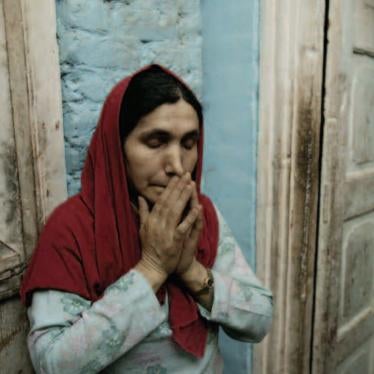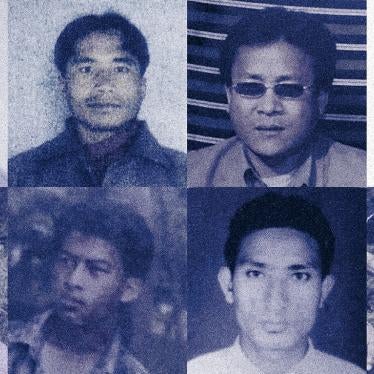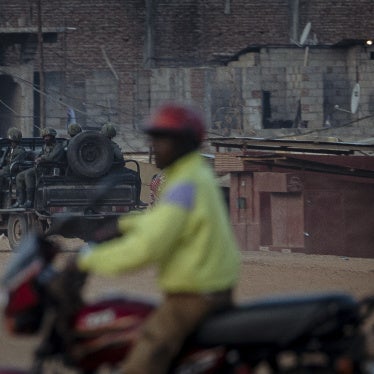(Srinagar) - The Indian government’s failure to end widespread impunity for human rights abuses committed both by its security forces and militants is fueling the cycle of violence in Jammu and Kashmir, Human Rights Watch said in a report released today.
The 156-page report, “‘Everyone Lives in Fear’: Patterns of Impunity in Jammu and Kashmir,” documents recent abuses by the Indian army and paramilitaries, as well as by militants, many of whom are backed by Pakistan. Indian security forces have committed torture, “disappearances” and arbitrary detentions, and they continue to execute Kashmiris in faked “encounter killings,” claiming that these killings take place during armed clashes with militants. Militants have carried out bombings and grenade attacks against civilians, targeted killings, torture and attacks upon religious and ethnic minorities.
These abuses have taken place against the backdrop of almost two decades of the failure of the political and legal systems in India and Pakistan to end abuses or punish the perpetrators. Since 1989, the armed secessionist struggle against Indian rule in Jammu and Kashmir has claimed more than 50,000 lives. Kashmir remains a potential flashpoint between the nuclear-armed neighbors India and Pakistan.
"Human rights abuses have been a cause as well as a consequence of the insurgency in Kashmir,” said Brad Adams, Asia director at Human Rights Watch. “Kashmiris continue to live in constant fear because perpetrators of abuses are not punished. Unless the Indian authorities address the human rights crisis in Jammu and Kashmir, a political settlement of the conflict will remain illusory.”
The new report, based on research from 2004 to 2006, documented abuses that have occurred since the election in 2002 of a Jammu and Kashmir state government with an avowed human rights agenda and the resumption of peace talks between India and Pakistan that same year (after the countries nearly went to war in 2002).
Indian security forces claim they are fighting to protect Kashmiris from militants and Islamic extremists, while militants claim they are fighting for Kashmiri independence and to defend Muslim Kashmiris from an abusive Indian army. In reality, both sides have committed widespread and numerous human rights abuses and violations of international humanitarian law (or the laws of war).
Extrajudicial executions by Indian security forces are common. Police and army officials have told Human Rights Watch that security forces often execute alleged militants instead of bringing them to trial in the belief that keeping hardcore militants in detention is a security risk. Most of those summarily executed are falsely reported to have died during armed clashes between the army and militants in “encounter killings.”
The Indian government has effectively given its forces free rein, while Pakistan and armed militant groups have failed to hold militants accountable for the atrocities they have committed. Through documentation of the failure to prosecute in recent cases and some older, key cases, the report shows how impunity has fueled the insurgency. If the Indian authorities had addressed these abuses seriously when they took place, public confidence in the authorities would have increased and future abuses may have been substantially reduced. Instead, India failed to prosecute or discipline the perpetrators.
Impunity has been enabled by Indian law. The report documents cases where Indian security forces have shot civilians under the authority of laws such as the Jammu and Kashmir Disturbed Areas Act and the Armed Forces (Jammu and Kashmir) Special Powers Act. These laws, enacted near the beginning of the conflict, allow lethal force to be used “against any person who is acting in contravention of any law or order for the time being in force in the disturbed area.” Other laws offer state agents effective immunity from criminal prosecution. For example, Article 197 of the Indian Code of Criminal Procedure only allows the prosecution of state actors with the permission of the relevant ministry. This is rarely provided. Prosecutions of security force personnel, even where the facts are well established, are therefore rare.
Human Rights Watch also stated that the work of both the National Human Rights Commission and the State Human Rights Commission in Jammu and Kashmir is severely hampered by laws that prohibit them from directly investigating abuses carried out by the army or other federal forces. Although government officials claim that disciplinary measures have been taken against some security personnel, it is unclear this happens, as details are almost never made public.
“It’s absurd that the world’s largest democracy, with a well-developed legal system and internationally recognized judiciary, has laws on its books that prevent members of its security forces from being prosecuted for human rights abuses,” said Adams. “It’s time for the Indian government to repeal these laws and recommit itself to justice for victims of all abuses, whoever the perpetrator may be.”
The report also documents serious abuses by militants, many of whom continue to receive backing from Pakistan. Numerous massacres, bombings, killings and attacks on schools attributed to the militants are often intentionally downplayed by supporters of Kashmiri independence or its accession to Pakistan. Militant groups have targeted civilians, including women and children, whom they consider to be “traitors to the cause” or for expressing views contrary to those of one or another armed group. Alleged militants have murdered nearly 600 Kashmiri politicians since the conflict began, usually as retribution for joining in the electoral process. Officials conducting the polls have been killed or tortured, some with their noses or ears chopped off.
Militants have also been responsible for bomb attacks that targeted civilians. They have attacked religious minorities in Kashmir such as Hindus and Sikhs, as well as ethnic minorities such as the Gujjars, whom the militants target because they believe them to be government informers. Although many of the militant groups currently operating in Jammu and Kashmir have become increasingly unpopular, Kashmiris are afraid to speak out against them. A conflict over Kashmiri identity and independence has slowly but visibly mutated into a fight under the banner of religion, pitting Islam against Hinduism and drawing religious radicals into its heart.
There is considerable evidence that over many years Pakistan has provided Kashmiri militants with training, weapons, funding and sanctuary. Officially, Pakistan denies ever arming and training militants. Under pressure from the United States after the attacks of September 11, 2001, Pakistan banned several militant groups in January 2002, including the Jaish-e-Mohammad and the Lashkar-e-Toiba. But these groups have continued to operate after changing their names. India blames these groups for many armed attacks. Pakistan appears to be keeping its options open should peace talks collapse by continuing to support these groups. Pakistan remains accountable for abuses committed by militants that it has armed and trained.
“The militants and their backers must end the bombings and the targeting of civilians,” said Adams. “Continued abuses ensure that the cycle of violence will continue. And these abuses only add to the suffering of the people in whose name the militants are ostensibly fighting.”







